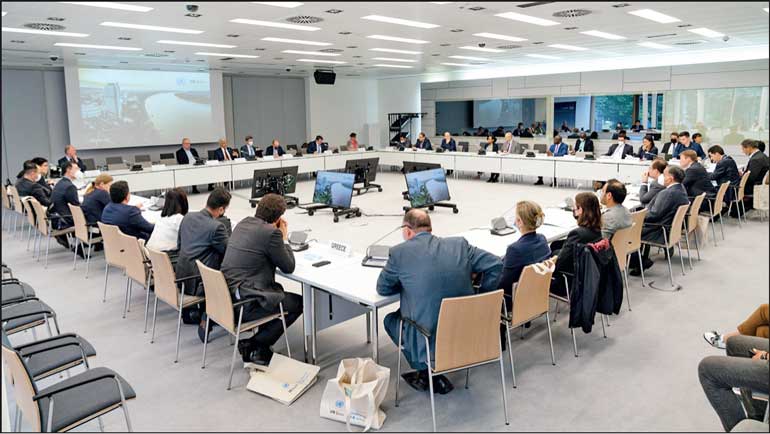Monday Feb 16, 2026
Monday Feb 16, 2026
Friday, 24 June 2022 00:09 - - {{hitsCtrl.values.hits}}

The Bonn Climate Change Conference took place from 8 to 16 June with the participation of 197 parties from around the world – Pic courtesy of UNFCCC
 Across the world, 197 parties—including all member states of the United Nations—are part of the United Nations Framework Convention on Climate Change (UNFCCC), which was established at the 1992 “Earth Summit” in Rio de Janeiro. Under the UNFCCC, these parties come together to negotiate issues related to climate change and find consensual solutions for implementing and scaling up climate action, most prominently in the annual meetings of the Conference of the Parties (COP). Previous COPs have resulted in the adoption of the Kyoto Protocol in 1997 (COP3) and the Paris Agreement in 2015 (COP21), as well as the further development of the “Paris Rulebook” in subsequent COPs.
Across the world, 197 parties—including all member states of the United Nations—are part of the United Nations Framework Convention on Climate Change (UNFCCC), which was established at the 1992 “Earth Summit” in Rio de Janeiro. Under the UNFCCC, these parties come together to negotiate issues related to climate change and find consensual solutions for implementing and scaling up climate action, most prominently in the annual meetings of the Conference of the Parties (COP). Previous COPs have resulted in the adoption of the Kyoto Protocol in 1997 (COP3) and the Paris Agreement in 2015 (COP21), as well as the further development of the “Paris Rulebook” in subsequent COPs.
Conference of the Parties and subsidiary bodies
However, while the COPs toward the end of each year draw large media attention and are attended by tens of thousands of delegates and observers, they are not the only major negotiation meetings. Between each COP, the subsidiary bodies to the UNFCCC—including the Subsidiary Body for Scientific and Technological Advice (SBSTA) and the Subsidiary Body for Implementation (SBI)—meet in Bonn, Germany, to continue discussions and lay the groundwork for the following COP.
This year, the 56th session of the subsidiary bodies to the UNFCCC took place from 6 to 16 June as the Bonn Climate Change Conference, with the participation of approximately 4,000 people from around the world. During these two weeks, the delegates discussed and negotiated a range of topics covering the main elements of the Paris Agreement as well as key aspects of climate action. This includes mitigation (rapidly reducing greenhouse gas emissions), adaptation (adjusting to climate change), loss and damage (dealing with unavoidable or unavoided impacts of climate change), and climate finance (mobilising funds for all aforementioned areas), as well as knowledge-sharing, capacity-building, technology transfer, action for climate empowerment, and more.
From planning to implementation
After the 26th meeting of the Conference of the Parties (COP26) in Glasgow, Scotland, last year, the guidelines for implementation of the Paris Agreement are largely complete. With this, the focus has begun to shift towards the actual implementation, with COP27—which will take place in Sharm el-Sheikh, Egypt, in November this year—choosing “together for implementation” as its official tagline.
On the mitigation side, it is clear that ambition needs to be scaled up to keep global temperature rise below 1.5 degrees Celsius. The Glasgow Climate Pact has set up a new work programme to achieve this, but parties could not find consensus on the exact modalities of how it should operate. This task remains for parties to take up again at COP27 and find a solution on how to bring down emissions faster and more decisively by 2030 at the latest.
Regarding adaptation, the Global Goal on Adaptation (GGA) was a key topic of discussion, as the first workshop of the Glasgow-Sharm el-Sheikh work programme took place. Under this work programme, parties attempt to define and operationalise the GGA through eight workshops over two years, culminating in COP28 at the end of 2023. However, while the GGA is supposed to be a sort of equivalent to the 1.5-degree/2-degree mitigation goal of the Paris Agreement, adaptation is much more complex to quantify and harder to generalise. Despite lengthy and intense negotiations, however, much work remains to be done throughout the following seven workshops.
Loss and damage describes the destruction and severe impacts that climate change is already causing to societies, economies, and countries, including Sri Lanka. In particular, vulnerable groups and communities often suffer disproportionate losses and damages to their livelihoods, culture, health, wellbeing, and even lives, with no dedicated financial aid available to address this. This thematic area is being discussed through the three-year Glasgow Dialogue, which was started at COP26, the workstream on the Santiago Network on Loss & Damage, and calls for a Loss & Damage Finance Facility by several parties and other actors. However, similar to mitigation and adaptation, parties decided to carry forward talks on these issues toward COP27 in Egypt, as they were not able to find complete agreement.
Other key outcomes and the road to Egypt
Mitigation, adaptation, and loss and damage are far from the only topics discussed and negotiated throughout the Bonn Climate Change Conference. Another important thematic highlight was climate finance and the new collective quantified goal on finance, which will replace the developed countries’ annual commitment of $ 100 billion for the years after 2025. As a critical cross-cutting issue, finance entered into various workstreams, with the incoming Egyptian COP presidency clearly stating that they want to prioritise this issue.
Furthermore, the Bonn sessions included areas of work such as inputs from climate science, the Global Stocktake—which will be the first progress assessment of the Paris Agreement—, agriculture, action on climate empowerment, capacity-building, carbon markets, technology transfer, the Nairobi Work Programme, National Adaptation Plans, response measures, and much more.
There has been progress on some agenda items while others seem to have mostly stalled, but overall, it is clear that COP27 will have to take up a multitude of crucial topics that cannot be delayed any further. If the world is to scale up ambition, prevent catastrophic climate change, and support vulnerable countries like Sri Lanka which are already impacted, decisive action needs to be taken as soon as possible, with the consensus of all parties.
(The writer works as Director – Research and Knowledge Management at SLYCAN Trust, a non-profit think tank based in Sri Lanka. His work focuses on climate change, adaptation, resilience, ecosystem conservation, just transition, human mobility, and a range of related issues. He holds a Master’s degree in Education from the University of Cologne, Germany and is a regular writer to several international and local media outlets.)